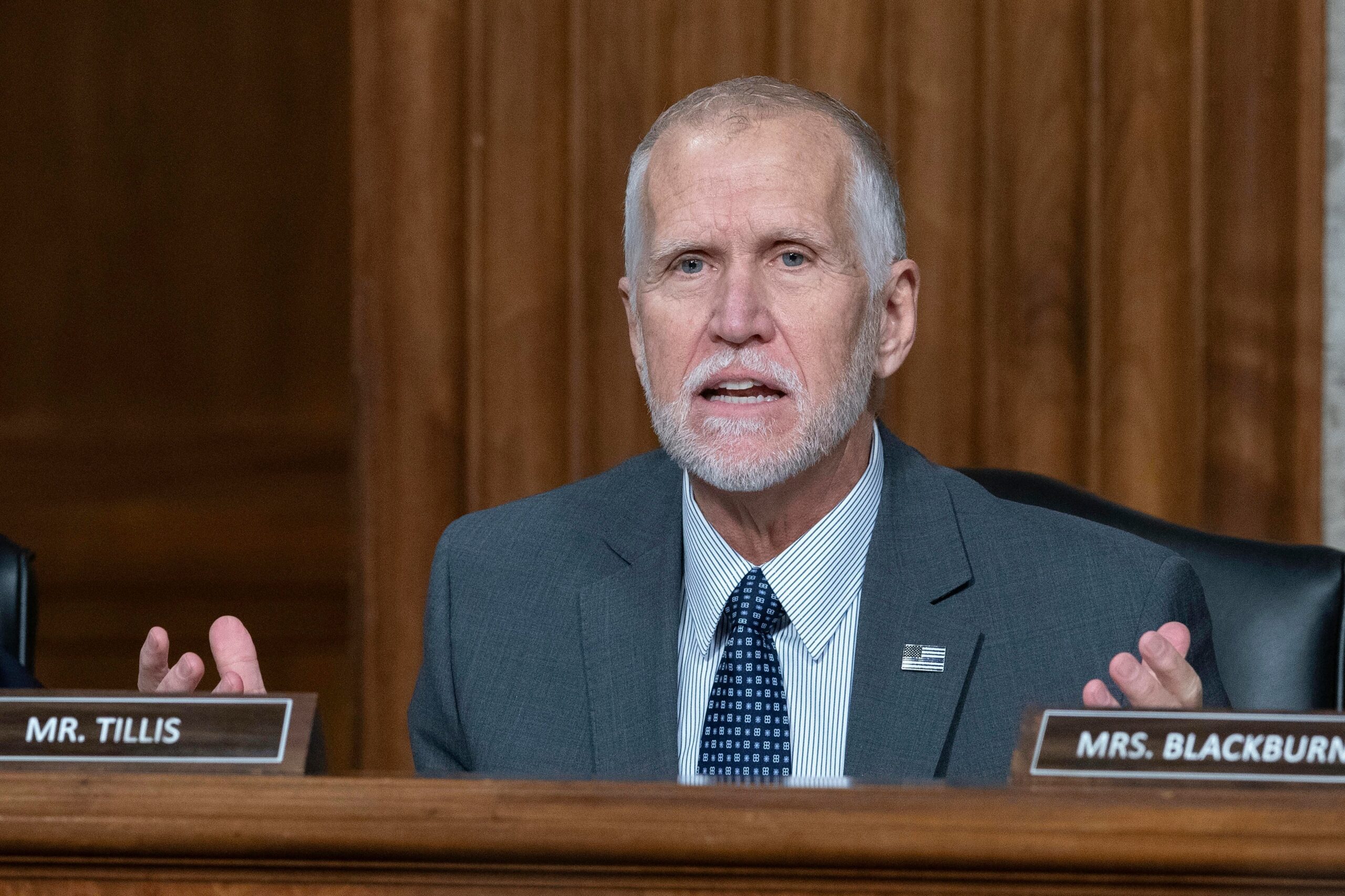WashingtonOne day after he made it clear that he would oppose President Donald Trump’s tax breaks and spending cuts plan because to its cuts to health care programs, Republican Sen. Thom Tillis of North Carolina abruptly announced on Sunday that he will not run for reelection the following year.
His choice opens a wide-open Senate campaign in a state that has historically been a heated battlefield, providing Democrats with a political opportunity to increase their numbers in the 2026 midterm elections. In a party where few lawmakers are prepared to risk Trump’s fury by criticizing his agenda or actions, it might also make Tillis a wild card. Trump said on Sunday that Tillis’ statement was “great news” and threatened to run against him in the primary.
In a long statement, Tillis said, “It has become increasingly clear in Washington over the last few years that leaders who are willing to embrace bipartisanship, compromise, and demonstrate independent thinking are becoming an endangered species.”
Though he acknowledged the challenging political climate for those who defy their party and go it alone, Tillis expressed pride in his public service career.
In a statement, Tillis stated, “I am excited to have complete autonomy to call the balls and strikes as I see fit and to do my best to represent the wonderful people of North Carolina.”
In the Senate, Republicans have a 53-47 advantage.
Trump had criticized Tillis in social media tweets for being one of two Republican senators who voted against the big tax bill’s advancement on Saturday night.
The senator did nothing to assist his constituents following Hurricane Helene’s devastating flooding in western North Carolina last year, and the Republican president accused Tillis of doing so in order to garner attention for his no-vote and threatened to run against him.
Trump wrote, “Tiltis is a talker and complainer, NOT A DOER.”
Senior Republicans were taken aback by the timing of the two-term senator’s announcement, but not necessarily by its content. According to a person close to the senator, Tillis had been strongly leaning toward retirement but had intended to disclose his reelection plans later this year, probably by September at the latest.
According to the person, who was given anonymity to discuss internal dynamics, Tillis was considering two issues in the hours leading up to his announcement: whether Trump and the White House would allow him to campaign with some degree of autonomy, and whether Tillis would have the full support of Senate Republican leaders.
The president’s Truth Social post urging a primary challenger to the senator and the GOP leadership’s decision to move forward with Medicaid cuts that Tillis repeatedly warned would destroy North Carolina made it abundantly evident to him that the answers to those two questions were no.
In order to eliminate any doubt about whether he would change his stance on the GOP’s comprehensive tax plan, Tillis then made the decision to declare his retirement.
On Saturday evening, he announced his retirement to Senate Majority Leader John Thune and President Trump.
Jason Simmons, the chairman of the North Carolina Republican Party, stated that the party will retain this seat for Republicans in 2026 and wishes Tillis well. In a statement, Senate Republicans’ campaign chairman, Sen. Tim Scott of South Carolina, stated that the party’s winning run in North Carolina will continue, although he did not specifically mention Tillis. Trump has won the state three times, Scott pointed out.
Democrats said they were optimistic about their chances.
When he declared his intention to run in April, former Representative Wiley Nickel stated that he was prepared to face any Republican opponent.
In a statement, Nickel stated, “We’re going to do it again. I’ve flipped a tough seat before.”
According to some, Tillis’ choice is just another example of how the Republican Party has drastically changed under Trump, with few politicians who oppose the president or his policies still in office.
According to Lauren French, spokesman for the Senate Majority PAC, a political organization affiliated with the Democratic members of the chamber, it “demonstrates that there is no room within the Republican Party to dissent over taking health care away from 11.8 million people.”
After resigning from his position as an IBM consultant to lead the GOP’s recruitment and fundraising efforts in the state House for the 2010 elections, Tillis became well-known in North Carolina. For the first time in 140 years, Republicans were able to secure majorities in both the House and Senate.
Later, Tillis was elected speaker of the state House, where he spent four years enacting conservative laws pertaining to abortion, taxes, gun rights, and regulations. Additionally, he supported a state constitutional referendum that banned gay marriage, which was eventually declared unlawful by the courts despite being approved by voters in 2012.
Tillis narrowly defeated Democratic Senator Kay Hagan in 2014, which contributed to the GOP gaining control of the U.S. Senate. He supported causes like Medicaid expansion, mental health and drug addiction treatment, and assistance for veterans during his more than ten years in office.
Tillis gained notoriety as a more moderate Republican who was prepared to compromise on certain topics. He occasionally ran afoul of his party because of that, most notably in 2023 when Republicans in North Carolina voted to censure him for a number of reasons, including his record on gun control and his opposition to specific immigration laws.
“I wouldn’t have changed a single one of those bipartisan initiatives, but sometimes they got me into trouble with my own party,” Tillis added.
___
This article was written by Makiya Seminera of the Associated Press in Raleigh, North Carolina, and Lisa Mascaro and Joey Cappelletti of the Washington bureau.
